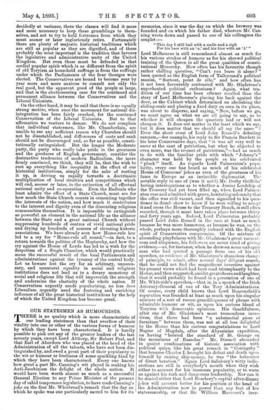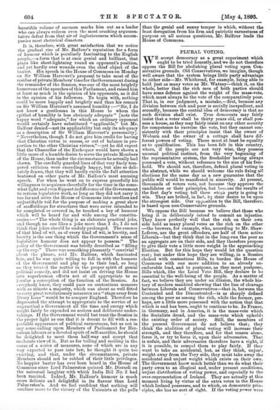OUR STATESMEN AS HUMOURISTS. T HERE is no quality which is
more characteristic of our leading statesmen than that overflow of their vitality into one or other of the various forms of humour by which they have been characterised. It is hardly possible to pick out any of the greater leaders of the last seventy years, except Lord Althorp, Sir Robert Peel, and that Earl of Aberdeen who was placed at the head of the Administration of all the talents, who have not been dis- tinguished by, and owed a great part of their popularity to the wit or humour or liveliness of some sparkling kind by which they have been characterised. Every one knows how great a part Mr. Canning's wit played in making his Anti-Jacobinism the delight of the whole nation. It would have been worth almost as much as a successful General Election to any Prime Minister of the present day of rabid temperance legislation, to have made Canning's joke on the first Mr. Whitbread's remark that the day on which he spoke was one particularly sacred to him for its memories, since it was the day on which the brewery was founded and on which his father died, whereon Mr. Can- ning wrote down and passed to one of his colleagues the couplet :— "This day I still hail with a smile and a sigh
For his beer with an •e,' and his bier with an "
Lord Melbourne is still remembered almost as much for his various strokes of humour as for his shrewd political training of the Queen in all the great qualities of consti- tutional Monarchy. How often has his favourite though rather chilling question, "Can't you leave it alone?" been quoted as the English form of Talleyrand's political maxim, " Surtout, point de zele," and how often has it not been favourably contrasted with Mr. Gladstone's superheated political enthusiasm ? Again, what tra- dition of our time has been oftener recalled than the story of Lord Melbourne's placing his back against the door, as the Cabinet which determined on abolishing the sliding-scale and placing a fixed duty on corn in its place, was about to disperse, and saying, "Now, before we go, we must agree on what we are all going to say, as to whether it will cheapen the quartern loaf or will not cheapen it. It does not matter in the least which we say, but it does matter that we should all say the same " ? Even the short crust of Lord John Russell's debating sarcasm,—for example, his reply to Sir Francis Burdett in his later Conservative days, that 'it was all very well to sneer at the cant of patriotism, but what he objected to even more, was the re-cant of patriotism,"—had as much to do with the familiar pride with which " Johnny's " character was held by the people as his celebrated " pluck " itself. As regards Lord Palmerston's popu- larity, every one has beard as much of his celebrated House of Commons' jokes as even of the greatness of his fame in Europe as an invincible diplomatist. Th., notable reply to one of (was it not?) Mr. Derby Griffiths' boring interrogations as to whether a Junior Lordship of the Treasury had yet been filled up, when Lord Palmer- ston rose and admitted with grave, hesitating solemnity that the office was still vacant, and then signalled to his ques- tioner in dumb show to know if he were willing to accept it and cross the House to the Treasury Bench, is still often recorded, though it must have taken place between thirty and forty years ago. Indeed, Lord Palmerston probably passed Lord John Russell in the race at least as much because he was more humorous, as because he was, on the whole, perhaps more thoroughly imbued with the English spirit of Conservative compromise. Of the mixture of abounding playfulness with Mr. Gladstone's great earnest- ness and eloquence, his followers are never tired of giving evidence,—as, for instance, when he drew-on some unhappy man who had quoted a passage from one of his old speeches, as evidence of Mr. Gladstone's shameless chang.; of principle, to admit, after several days' diligent search, that he could not find the magnificent invective against his present views which had been read triumphantly to the House, and then suggested, amidst great cheers and laughter, that it would probably be found in a peroration of one of Mr. Whiteside's speeches,—that is, in a speech of the Irish Attorney-General of one of the Tory Administrations. Of course, every child knows that Lord Beaconsfield's reputation was founded at least as much upon his singular mixture of a sort of rococo grandiloquence of phrase with admirable humour or wit, as upon his curious blend of Toryism with democratic opinions. His thankfulness, after one of Mr. Gladstone's most tremendous invec- tives, that there had been "a substantial piece of furniture" between them, was not at all less delightful to the House than his curious congratulations to Lord Napier of Magdala, after the Abyssinian expedition, on having "hoisted the standard of St. George on the mountains of Rasselas." Mr. Disraeli abounded in quaint combinations of historic association with political quips, like his great remark in " Coningsby " that because Charles I. brought his defeat and death upon himself by raising ship-money, he was "the holocaust of direct taxation." Again Lord Salisbury's witty indis- cretions are still in everybody's mouth when they wish either to account for his immense popularity, or to warn us against his rash and dangerous leadership. Nor can it be denied either that Lord Rosebery's capital after-dinner jokes will account better for his position at the head of the Administration now in power than any feat of his statesmanship, or that Sir William Harcourt's inex- haustible volume of sarcasm marks him out as a leader who can always redeem even the most crushing argumen- tative defeat from that air of ingloriousness which accom- panies most rhetorical disasters.
It is, therefore, with great satisfaction that we notice the gradual rise of Mr. Balfour's reputation for a form of humour which is peculiarly fascinating to the English people,—a form that is at once genial and brilliant, that plays like sheet-lightning round an opponent's position, and yet hardly ever wounds even the chief object of the banter. His speech in the House of Commons on Monday on Sir William Harcourt's proposal to take most of the residue of private Members' time for the Government during the remainder of the Session, was one of the most brightly humorous of the speeches of this Parliament, and raised him at least as much in the opinion of his opponents, as it did in the opinion of his followers. To begin with, nothing could be more happily and brightly said than his remark on Sir William Harcourt's assumed humility :—" Sir, I do not know a gentleman in this House to whom the epithet of humility is less obviously adequate" [note the happy word "adequate," for which an ordinary opponent would certainly have substituted "applicable," but Mr. Balfour denied—not its applicability but only its adequacy as a description of Sir William Harcourt's personality]. "Nevertheless, though I do not give him credit for having that Christian virtue in excess, or out of balance in pro- portion to the other Christian virtues,"—yet he did expect that the Chancellor of the Exchequer would have shown a little more of a humble desire to serve the private Members of the House, than under the circumstances he actually had shown. The carefully guarded lines of that very finely tem- pered criticism were exceedingly happy, but also so deli- cately drawn, that they will hardly excite the full attention bestowed on other parts of Mr. Balfour's most amusing speech. For when he went on to express gracefully his willingness to acquiesce cheerfully for the time in the some- what light and even flippant indifference of the Government to serious legislative work, so long as they did not carry it too far and drive the House of Commons into needless and unjustifiable toil for the purpose of making a great show of scaffoldings for structures that were never intended to be completed or covered in, he touched a key of humour which will be heard far and wide among the constitu- encies :—" The whole thing is an elaborate practical joke, and though no one likes a joke more than I do, I do not think that jokes should be unduly prolonged. The essence of that kind of wit, as of every kind of wit, is brevity, and brevity is the one thing which the Government's sense of legislative humour does not appear to possess." The policy of the Government was briefly described as "filling up the cup." There was something pleasantly " convivial " about the phrase, said Mr. Balfour, which fascinated him, and he was quite willing to fall in with the humour of the Government and play up to their lead, so long as t hey treated the matter in the proper spirit of genial political comedy, and did not insist on driving the House into superhuman efforts not at all appropriate to so jocular a conception of the function of the Session. As everybody knew, they could pass no contentious measure with so minute a majority, which was about as well fitted to carry great revolutionary measures as a" stage army from Drury Lane" would be to conquer England. Therefore he • deprecated the attempt to appropriate to the service of so unpractical a Government all the time and energy which might fairly be expended on serious and deliberate under- takings. If the Government would but treat the Session in the proper light as one that it is decent to fill with a res- pectable appearance of political earnestness, but as not in any sense calling upon Members of Parliament for Her- culean labours or a devoted spirit of self-sacrifice, he should be delighted to meet them half-way and accept that moderate view of it. But as for toiling and moiling in the cause of a series of measures, none of which are in any way expected to pass into law, he thought it quite too exacting, and that, under the circumstances, private Members should not be robbed of their little privileges. No happier banter has ever been heard in the House of -Commons since Lord Palmerston quizzed Mr. Disraeli on the universal laughter with which India Bill No. 2 had been received. Indeed, Mr. Balfour's humour is much more delicate and delightful in its flavour than Lord Palmerston's. And we feel confident that nothing will conduce more to the victory of the Unionists at the polls than the genial and sunny temper in which, without the least derogation from his firm and patriotic earnestness of purpose on all serious questions, Mr. Balfour leads the House of Commons.







































 Previous page
Previous page